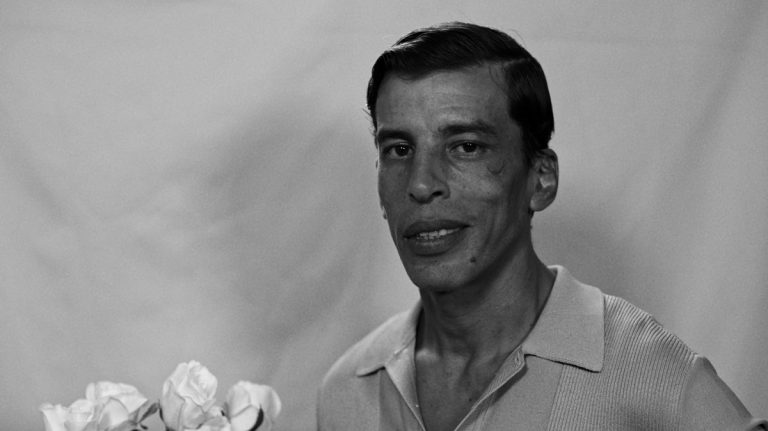Right from the opening of Lois Patiño’s endlessly beguiling new film “Ariel,” reality is ruptured. The sky and the sea are mottled with a purple glow. The camera shifts its gaze to a troupe of performers on the shores. It’s a Shakespeare play; there’s a rapt audience watching. Agustina Muñoz plays herself, an actress whom the troupe has tapped to play Ariel from The Tempest.
Set in the Azores, she travels to an island to partake in a production. However, a heightened air of the uncanny sets in on the ferry trip itself. Suddenly, everyone aboard except Agustina slips into sleep, as if hexed. It gets even more confounding when she reaches the island. Each of its inhabitants is a Shakespeare character. Agustina is baffled. She thinks they are all playing some trick on her. But they refuse to shake off their performative air.
It’s everywhere she goes, on the streets, at the convenience store. All are acting out a Shakespeare play. They don’t pay any attention to her mounting exasperation. She is disoriented, puzzled, and supremely vexed by the norms of behavior on the island. Quickly the whole thing no longer registers as just some amusement that surprises a newcomer like Agustina. She, too, is invited to be inducted into the exercise.

On this island, repetitions govern the way of life. The rules are clear to its residents, who faithfully comply with no knowledge of an alternative. To transgress, you must first know that you are bound up, a conscious desire to breach is necessary. The islanders do seem to know they are in a loop. At sunrise, the play begins. By sunset, it must end. The next day brings in the same cycle. Caught in the frenzy of having to complete their plays in time, the islanders are left with no time to ponder what-ifs that signal demands for liberation.
However, Agustina’s startlement, her digging into the way of life prods and provokes questions in a few inhabitants. Curiosities about self-authorship and agency simmer to the surface. Where is the personal will? How can they rewrite their destinies? Is it possible at all, or is such new-kindled hope futile and utterly doomed? Few men yearn for freedom of choice, a life whose fate isn’t pre-written. Yes, they are cognizant of the grand storyteller, Shakespeare, orchestrating their trajectories. All are slaves to script, a book opening and closing every day.
The film walks through a realm that’s almost metaphysical, one resisting binds, any prerogative to a realist mode of narration. Boundaries between performer and character are as porous as mystifyingly invisible. Self-reflexivity here assumes multiple registers of meaning and implication. At one point, people in the frame turn to wonder who is behind its construction. Their questioning glare pivots towards us, the viewer. Nevertheless, the men quickly abandon this line of inquiry, intent on channeling instead and snipping what seems manageable.

Agustina’s provocation ruffles the island and activates a reconsideration of what they believe is an eternal life cycle. Obedience to a text governs, and flattens expectations from each day. When Agustina meets Ariel (Irene Escolar), she is struck by the latter’s submission to the order of the island. She insists on Ariel to be free. Is she even Ariel if she is so willingly trapped? Agustina drives her to rethink who and what she feels beholden to; all that she can challenge becomes now a vast playground of new desires, feelings she had long suppressed while marching to the beat of familiar rules.
Are we inside a dream, a play, or a film? Characters in “Ariel” wonder. Interrogations into their individual agency perforate the narrative fabric. We are reminded occasionally characters, well-conceived, can themselves take over their determining arcs. A good author is one who listens and allows space for his characters. These reiterations gesture to the awakening of Ariel, who does balk and flinch from the impetus Agustina underlines.
Much of the film’s ethereal texture is shaped through Ion de Sosa’s camerawork, situating the ramblings through this strange place in a state of suspension. As we traverse the topography with Agustina, who passes by and enters myriad plays in progress, seemingly abstruse litanies feel close to the twine of life, its conflicts, and dilemmas. Through it all, Agustina has just one plea: Let’s rebel! Overall, “Ariel” is a magical, effortlessly alluring exhortation to break free.





![Mukti Bhawan [2017]: A Delicate Meditation on Death & Salvation](https://79468c92.delivery.rocketcdn.me/wp-content/uploads/2017/04/hotelsalvation-768x324.jpg)
![Yes, God, Yes [2020] Review : Natalia Dyer leads Journey of a Catholic teenager going through her sexual awakening](https://79468c92.delivery.rocketcdn.me/wp-content/uploads/2020/08/Yes-God-Yes-Natalia-Dyer-1-768x432.png)

